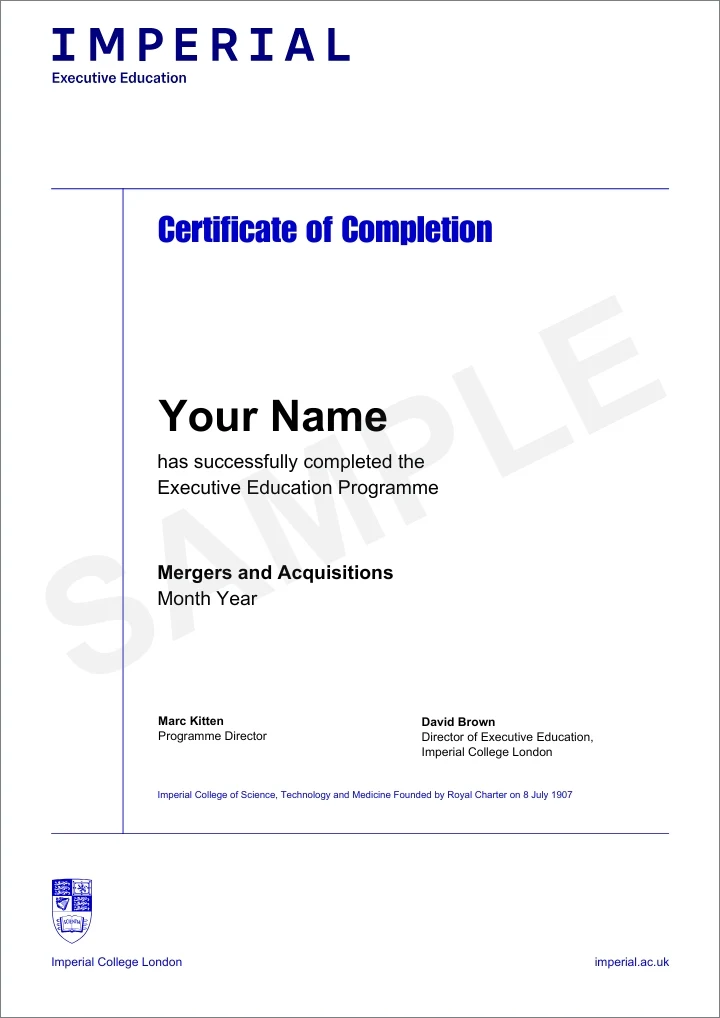Mergers and Acquisitions
Key takeaways
At the end of this 11-week online programme, you will be able to:
Recognise the various forms of corporate restructuring and their potential value
Identify the differences, functions, benefits and challenges of M&A
Illustrate the M&A process, including structuring, negotiating and valuation
Explain the factors and process for successful post-merger integration
Examine the roles and careers in M&A

What you will learn
This online programme focuses on the strategic and financial aspects of corporate restructuring, helping you identify the unique opportunities and challenges of M&A and providing you with clarity and confidence throughout the M&A cycle.
Testimonials
Who is this programme for?
Building on your business knowledge in accounting, finance, valuation, strategic management and organisational behaviour, this programme is designed to expand your skills in M&A techniques and transactions. It will be most valuable for:
Senior executives responsible for their organisation’s growth, portfolio, and investments, especially executives seeking to capture value through mergers to create synergies of revenue, cost and capital
Mid-level managers responsible for accounting, valuation, research, financial modelling and smaller-scale investment decisions, particularly those seeking to transition to an M&A role and build credibility and influence in dealmaking
Professionals in investment banking and finance who are responsible for sourcing, executing and managing deals, as well as building relationships with investment banks and private investors. It is particularly valuable for consultants seeking to create value for organisations and build expertise in deal management
Legal professionals working as legal counsel to investment banking, finance or law organisations, especially those who ensure compliance for their clients, structure transactions, provide due diligence and prevent antitrust liability in M&A
Consultants advising client organisations on financing and investing decisions looking to understand the M&A process from both sides, the roles of those involved and how M&A works in an international context
The programme is also suitable for various M&A professionals with the following goals:
Strategic insights: If you are looking to develop strategic insights and frameworks to evaluate and execute M&A transactions effectively
Career advancement: If you want to enhance your career by demonstrating your knowledge and gaining credentials in M&A
Knowledge expansion: If you are looking to expand your knowledge and understanding of M&A to become more effective in your current or next role
Practical application: If you want to learn to apply M&A knowledge to real-world scenarios
Network building: If you are building a network of peers and industry experts through the programme
Programme highlights

Video lectures
Learn at your own pace with dynamic and engaging recorded video lectures led by programme faculty.

Live webinars
Participate in four live sessions with programme faculty to reinforce topics and magnify your knowledge.

Weekly assignments
Expand your understanding of the module topics through weekly assignments based on programme content and suggested reading.

Case studies
Explore the challenges, wins and failures of corporate restructurings in real-world case studies.

Interactive activities
Exchange perspectives with classmates from around the world by participating in discussions, polls and surveys.

Hands-on activities
Solidify your learning with self-study and required activities related to each module.

Capstone project
Work on a capstone project, and apply programme insights to propose an M&A deal.

Dedicated programme support team
Receive personal support from a dedicated learning team throughout the programme.

Continuous programme access
Enjoy access to videos and learning material for up to 12 months from the programme start date.

Certificate of completion
Earn a verified digital certificate from Imperial Executive Education.

Capstone Project
The capstone project helps you apply programme insights to the complexities of M&A transactions. By utilising the functional knowledge of corporate restructuring, you will analyse potential M&A opportunities and prepare a strategic report for a proposed M&A deal. By working on this project, you will learn to plan and execute M&A transactions that create significant value for your organisation.
Mergers and Acquisitions with Imperial Executive Education
As part of Imperial College London, one of the top ten universities worldwide, Imperial Executive Education drives global business and social transformation through the fusion of business, technology and an entrepreneurial mindset. We attract brilliant minds and provide the environment to foster innovative thinking, resulting in groundbreaking ideas that unlock business opportunities. The Mergers and Acquisitions programme has been designed with the same careful balance of teaching, hands-on coursework and training that Imperial College London values across all of its programmes. It delivers a strategic curriculum that you can leverage right away to structure your own M&A deal.
Meet the faculty

Partner and Co-Founder, Candesic; Visiting Professor in Finance, Imperial College Business School
Marc Kitten has over 30 years of experience in transactions and financial markets. In 2003, he co-founded Candesic, a London-based strategy consultancy, specialising in health...

Certificate
Upon completion of the programme, participants will be awarded a verified digital certificate by Imperial Executive Education.
Please note that this programme contributes to earning Associate Alumni status. Visit the Associate Alumni page to find out more.
Imperial College Business School Global MBA
Successful completion of the Mergers and Acquisitions programme may be used for credit on the Imperial College Business School Global Online MBA, subject to acceptance onto the Global Online MBA programme. Completion of this programme does not guarantee entry to the Global Online MBA programme.
FAQs
Didn't find what you were looking for? Write to us at learner.success@emeritus.org or Schedule a call with one of our Programme Advisers or call us at +44 208 629 1765 (UK) / +1 315 509 2976 (US) / +65 3138 2451 (SG)
Early registrations are encouraged.
Flexible payment options available.
Starts On





